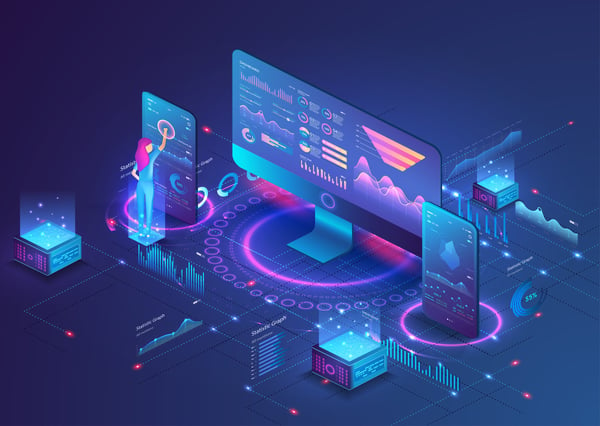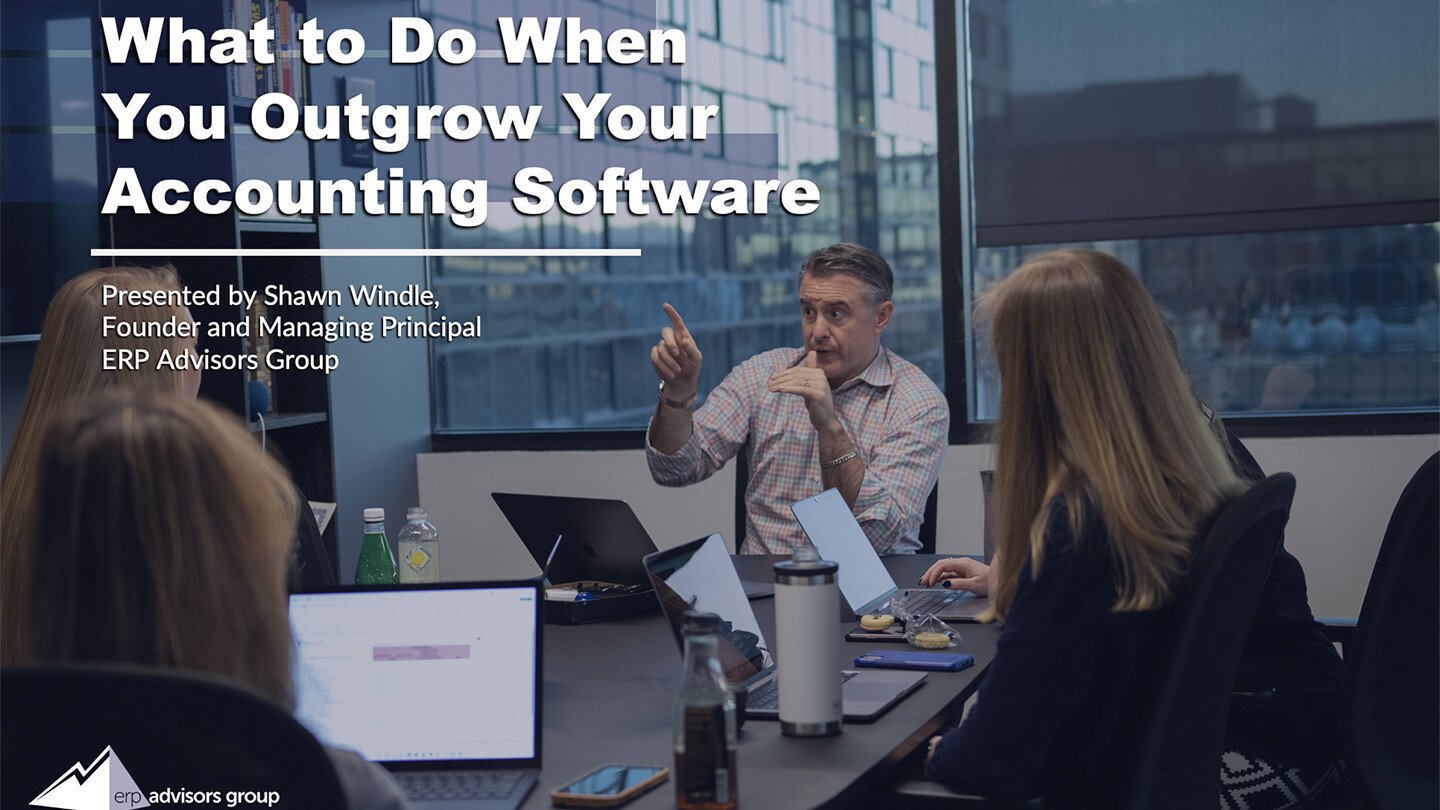
Most busy, productive finance and accounting professionals wish they and their staff had more time in the day to do the value-add tasks that require time and space to analyze their financial data and make recommendations to better the business. However, many find themselves mired down in manual processes including spreadsheet manipulation, repetitively clicking through multiple systems, and performing time-consuming data entry to complete basic tasks.
The Role of Artificial Intelligence in ERP
While Artificial Intelligence (AI) in ERP software is not new, recent technological advancements, including ChatGPT, have increased the notoriety of AI and sparked a race among software vendors to offer AI capabilities within their products. The real technological race has started and the next ten years in ERP will make the last 50 seem like nothing in comparison.
AI itself is a mind meant to constantly be learning and acquiring new data. The utilization of vast data sources will impact the AI's ability to learn and expand its content generation capabilities. A generative AI application offered online, like ChatGPT, will learn from a network of resources available across the web, in addition to information being fed to it directly by its users. Alternatively, an internal AI, such as one integrated with your ERP system, will learn from the information that you provide or allow it to access, which could include the internet. These internal AI offerings provide considerably more data protection and cyber security because it is not necessarily connected to an external network. However, with AI still in its infancy and many vendors continuing to craft their stances on the handling of AI-associated data, there are still uncertainties and ethical discussions that will emerge. This includes the ability for vendors to share the content they gather within their AIs to enhance knowledge across customers, even when some may be competitors. Only time will tell how these systems are shaped.
Why Does AI Matter?
The Oxford Dictionary defines Artificial Intelligence as “The theory or development of computer systems able to perform tasks that normally require human intelligence, such as visual perception, speech recognition, decision-making, and translation between languages.” Technology continues to advance beyond its original boundaries, freeing individuals to complete more value-added tasks. The current state of AI allows businesses to accelerate their own productivity, not replace its valuable human resources. Generative AI is a relatively new offering, as well, wherein businesses are not limited to just low-level automation offered by an AI solution, but they can also begin to create content. This can be done by uploading data into the system to generate things like financial reports, decks, and more. Taking it even a step further, individuals will be able to provide feedback to the AI to ask for design changes, content updates, and the like to enhance their individual ability to create content or even ask questions to receive clarification regarding why the data is the way it is.
Developers are currently configuring artificial intelligence in ERP systems to take over tedious, manual tasks. Developers are even utilizing ChatGPT to write software code, which is almost viable for actual usage, requiring only minor tweaks. Ultimately, AI could identify broken code once the code has been embedded. This is a minor example of how emerging technologies can enable businesses to make strides toward revolutionizing business operations.
How Will AI Change the ERP Landscape?
The biggest question in the coming years will be, at what point will we allow technology to make choices for us? Many hope AI will reach the point of “set it and forget it,” where the system makes financial and operational decisions for the company. While this may seem like an ideal state, it isn’t currently possible due to the need for a human touch to fix mistakes, biases, and more.
Artificial Intelligence and Machine Learning have already existed in ERP for many years in core business processes, expediting processes such as automated accounting functions, employee feedback, and more, but now the market is entering the next level of innovation.
Any business processes touching the ERP which are not automated are game for AI enhancements. Therefore, incorporating AI technology into ERP could play a pivotal role in streamlining operations and ultimately improving profitability. Generative AI offerings are truly changing the way that businesses interact with their ERP -- not only by automating tedious tasks but also by generating content quickly by relying on the data within their own system. These advancements will enable individuals to be more productive and effective in providing reports, delivering value to clients, or even identifying opportunities for improvement across the organization. A great AI solution will add an extra layer to the framework of an ERP, empowering employees to fully leverage the data already in their system at the touch of a button or with a simple command.
As technology advances, more and more customers will expect ERPs to provide the convenience of AI business tools but it might not always be realistic. Ideally, vendors will quickly adopt these technological advancements into their offerings to drive real value for clients, but some will be slow to evolve with the trends. Clients will expect even more value from Phase 1 of implementation including adding or building new mini solutions within their ERP almost instantaneously. While these goals have yet to be realized, we are advancing toward AI becoming more widely available. Vendors may build the solutions and distribute them among customers more efficiently through “cookie-cutter-style” implementations. Prescribed implementations with baked-in best practices will provide smaller companies access to high-quality solutions that were previously inaccessible.
Potential Risks of Artificial Intelligence
Artificial Intelligence is a relatively new offering, especially as predictive analysis and predictive text continue to advance. Major questions will begin to emerge, such as: “How do we know the information we are being provided with is accurate?” or “Where is my data being stored?” AI solutions scour millions of pieces of data in order to provide answers, but this means the system is likely not giving an exact answer, but a culmination of the data it has gathered, essentially analyzing quantities of information for you which may or may not be correctly related to each other. That being said, the unknown nature of current AI data storage policies and practices puts businesses at risk of data leakage or hacking. Eventually, businesses will be utilizing AI systems to write code for their proprietary product offerings, but if proper security measures are not in place, what is going to prevent competitors from accessing the information and copying it? An example of this would be a vendor using AI to assist them in writing code to create an entirely new product not available anywhere else on the market. Because there are currently no clear guidelines for the storage and protection of data entered into AI solutions, there are no safeguards or laws in place to prevent another organization from obtaining the code and reproducing the product. Related, businesses may upload sensitive data or business models into a public AI solution to produce reports or other deliverables and be unaware of the security of this data or how accessible it will now be to outside parties, even competitors. These are just some examples of the risks businesses will be taking in the infancy of AI.
Additionally, businesses will be risking their data when using AI to take notes or summarize meetings, especially when discussing private information. Having a note transcriber tool that can create text from spoken words is one thing, saving your data in your own application, it’s another thing to use an AI tool that transcribes spoken words from your business meetings and then preserves all your data in its own data banks for analysis across all its customers.
At a high level, what will prevent ERP software vendors from sharing benchmarking data with customers, ultimately empowering businesses to understand how they compare to their competitors and taking away earned advantages? It could also present an issue where users end up going back and forth with the AI for explanations of why the data is the way that it is. In the end, there will always be benefits and pitfalls to digitalizing operations and risks to consider as AI plays an increasing role in business.
Conclusion
Fear of technological advancement is no new concept, with movies and pop culture often painting the picture of a dystopian world where technology takes over and eliminates the human experience; however, ERP and AI are extremely useful tools that will be vital to the technology industry. Need to upgrade your ERP system and don’t know where to start? Schedule a free introduction call with our expert ERP consultants, today!





